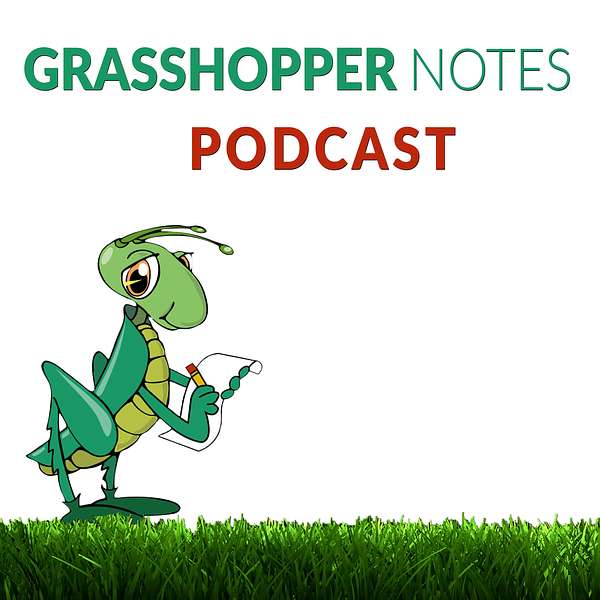
Grasshopper Notes Podcast
The Grasshopper Notes Podcast is hosted by John Morgan the man who has been billed as America’s Best Known Hypnotherapist.
John’s podcasts are a collection of guided meditations and bite-sized, mini podcasts which open you to new ways of thinking, communicating, and responding. You get a finer appreciation of how your mind works and how to use your internal resources to your best advantage.
See a video of John's background at the following link: https://www.youtube.com/watch?v=XbCPd00ok0I
In short, John Morgan is a people helper. Explore this channel and see what he can help you discover.
Grasshopper Notes Podcast
Not Guilty
Use Left/Right to seek, Home/End to jump to start or end. Hold shift to jump forward or backward.
There is a way to unburden yourself from guilt. Listen to this mini podcast and find out how.
Grasshopper Notes are the writings from America's Best Known Hypnotherapist John Morgan. His podcasts contain his most responded to essays and blog posts from the past two decades.
Find the written versions of these podcasts on John's podcasting site: https://www.buzzsprout.com/1628038
"The Grasshopper" is the part of you that whispers pearls of wisdom that seem to pop into your mind from out of the blue. John's essays and blog posts are his interpretations of these "Nips of Nectar." Others have labeled his writings as timeless wisdom.
Most of the John's writings revolve around self improvement and self help. They address topics like:
• Mindfulness
• Peace of mind
• Creativity
• How to stay in the present moment
• Spirituality
• Behavior improvement
And stories that transform you to a wider sense of awareness that presents more options. And isn't that what we all want, more options?
John uploads these podcasts on a regular basis. So check back often to hear these podcasts heard around the world. Who wants to be the next person to change?
Make sure to order a copy of John's new book: WISDOM OF THE GRASSHOPPER – 21 Days to Creativity. These mini-meditations take you inside where all your creative resources live. And you'll come out not only refreshed but recommitted to creating your future.
It's only $16.95 and available at BLURB.COM at the link below. https://www.blurb.com/b/10239673-wisd...
Also, download John's FREE book INTER RUPTION: The Magic Key To Lasting Change. It's available at John's website https://GrasshopperNotes.com
Not Guilty
Here’s a verdict from The Grasshopper delivered years ago: “Guilt Isn’t A Thing; It’s A Pattern Of Thinking.”
How guilty can you feel? You didn’t have to be brought up by a Jewish mother or raised Catholic to answer. We all feel guilt. And although it’s a noun, it’s not a thing.
The frame of mind known as guilt is often used as a motivator to get us to do something we think we should, yet don’t want to do. Here’s a little secret: Motivation produced by guilt produces more guilt, not more motivation.
Guilt is also produced by judging a past action by a present level of awareness. You think about something you did that, if you had to do it over again, you would now do it differently. That's something we all do that can act as self-correcting reflection OR it can be a pathway to burdening guilt.
My favorite example is this one: You come home from work after a “god awful” day and you encounter your children at play. They’re just being the kids they normally are, doing the things they normally do, but on this night their behavior is vexing to you.
You shout out, “quiet down!” and the children quietly slink off.
Fifteen minutes later you’re much calmer and realize that you overreacted. The kids were just being kids. You start to feel guilty about your behavior and the guilt starts to feed a narrative of how lousy a parent you are, and you’re on your way to feeling worse than when you walked through the door – guilt producing more guilt.
We talk about guilt as though it were a solid entity – a thing. It’s only a frame of mind that, if left unchecked, multiplies into a blob of bad feelings.
To stop your guilty feelings in their tracks takes some noticing and some action. Notice the narrative in your head that’s beginning to cause guilty feelings. Just noticing that you’re “thinking guilty” is often enough to stop its progression. But taking action regarding your past actions insures that guilt goes away.
One of the most productive guilt removal actions we rarely use is an apology. In the case of yelling at the kids, you might say, “Hey guys, I’m sorry I yelled at you when I came home. You didn’t do anything to deserve that and I’m sorry.” It’s truly amazing to me how heartfelt, unqualified apologies make guilt disappear.
You can also apologize to yourself. Let’s pretend that you’re beating yourself up for not doing what you think you ‘should’ do. If you play that scenario out to its natural conclusion, you’d be in a constant state of guilt. What if you begin to notice that your guilty thoughts are creeping up on you, and then you apologize to yourself for measuring yourself against a standard that can't be achieved – perfection – for example, being the perfect husband, wife, father, mother, daughter, son, etc.
When you use the “perfect” measuring stick, guilt will always ensue. When you apologize to yourself for expecting perfection, your guilty feelings begin to melt and fade away.
I'm reminded of this pithy quote from Robert Brault: "Life becomes easier when you learn to accept an apology you never got."
If you stop treating guilt as a thing and notice it to be a pattern of thinking instead, you’ll make the necessary apologies and clear the guilt out of your head.
All the best,
John
